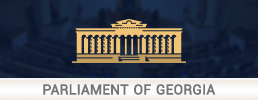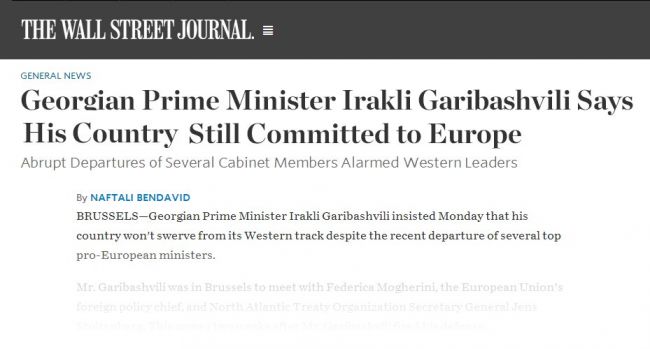2014-11-26
BRUSSELS- 17 Nov-Georgia's Prime Minister insisted Monday that his country won't swerve from its Western track despite the recent departure of several top pro-European ministers.
Irakli Garibashvili was in Brussels to meet with Federica Mogherini, the European Union's foreign policy chief, and NATO Secretary General Jens Stoltenberg. This comes two weeks after Mr. Garibashvili fired his defense minister, prompting the resignations of the foreign minister and minister for European integration.
Those abrupt departures alarmed Western leaders. But Mr. Garibashvili said in an interview that his entire government is committed to Europe, and that parting shots to the contrary by the former ministers were "extremely irresponsible."
"Who is pro-Soviet? We are all pro-West," Mr. Garibashvili said. "They invented this label, that they are pro-West and maybe some others in the government are not. It was even insulting for my government to say that only three ministers were pro-Western."
Mr. Garibashvili said the cabinet reshuffle stemmed from internal politics. "This is purely a domestic issue. It has nothing to do with our country's European and Euro-Atlantic integration course," he said. "This is ridiculous."
Still, European Union foreign ministers said they would watch carefully in coming weeks to ensure Georgia isn't veering from the rule of law. Georgia has recently prosecuted several high-profile people, including former President Mikheil Saakashvili, leading some in the West to ask if the moves were politically motivated.
Lithuanian Foreign Minister Linas Linkevicius said Monday that Georgia now must show the sincerity of its promises on democracy. Now that Garibashvili has a new team, he can ensure that it plays by the rules.
"It should prove it by deeds," Mr. Linkevicius said.
The stakes are high because Russia has been turning up the pressure on countries on its periphery, especially Georgia and Moldova.
The EU assigned "association agreements" this summer with Ukraine, Georgia and Moldova, aiming to bolster trade and political ties with those countries, provoking Moscow's anger
In response, Russia has announced it is pursuing a treaty on "alliance and integration" with Georgia's breakaway region of Abkhazia, which is under Russian control. "It is another huge step toward the annexation of Georgian territory," Mr. Garibashvili said, though he added that he tries to work constructively with Russia.
In Moldova, Russian President Vladimir Putin met recently with separatists and leaders of the pro-Moscow Socialist Party, highlighting Russia's influence ahead of Moldova's elections on Nov. 30.
The EU is attempting to push back against such moves. The high-level committee coordinating the EU-Georgia association agreement met for the first time Monday, while EU officials agreed to proceed with plans to relax visa requirements between the two sides.
Mr. Garibashvili and Mr. Stoltenberg, the NATO chief, planned to discuss how to implement a NATO-Georgia cooperation plan announced in September.
Johannes Hahn, the EU's point man on enlargement, said Friday that his biggest worry regarding Georgia was the prospect of politically motivated prosecutions. "They have to take care that the independence of the judiciary system is guaranteed [and] that there is a transparency how certain court cases are pursued," Mr. Hahn said.
Mr. Garibashvili said his government has completely reformed its judiciary, and European leaders can watch the trials of Mr. Saakashvili and others if they choose. "They are absolutely open and transparent," Mr. Garibashvili said. "You can go and attend any court trial with your camera."
The ministers' departures, he added, were prompted by a legitimate corruption probe of the Defense Ministry. When former Defense Minister Irakli Alasania improperly blasted the investigation, Mr. Garibashvili said, that gave him little choice but to fire him. Mr. Alasania said the probe was politically motivated and targeted pro-Western figures.
Mr. Garibashvili expressed confidence he could overcome European skepticism. But some European officials sounded like they still needed convincing.
"It's a decisive period" for Georgia, Mr. Linkevicius said.












